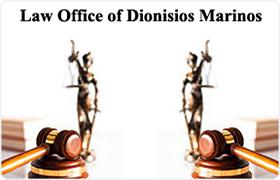Marina Del Rey Divorce & Family Law Lawyer, California
Sponsored Law Firm
-
 x
x

Click For More Info:
-
Law Office of Dionisios Marinos
5150 E Pacific Coast Hwy Suite 200 Long Beach, CA 90804» view mapDivorce & Family Law Committed To Client Satisfaction
Don't hesitate to call the Law Office of Dionisios Marinos in Long Beach, CA. We are committed to your satisfaction. Call us today.
800-846-1250
Richard D. Freiman
✓ VERIFIEDAccident & Injury, Employment, Estate, Divorce & Family Law
Richard Freiman is a practicing attorney in the state of California. He received his J.D. from Brooklyn Law School and his LL.M in Taxation from New Y... (more)
Edmond Elias Salem
✓ VERIFIEDReal Estate, Personal Injury, Family Law
Edmond Salem is a practicing lawyer in the state of California handling family law matters.
Monica Ariel Mihell
Child Support, Adoption, Corporate, Business Organization
Status: In Good Standing
Michael Marshall
Estate Planning, Employment, Family Law, Business Organization, Administrative Law
Status: In Good Standing
FREE CONSULTATION
CONTACTFREE CONSULTATION
CONTACTKatherine Su
Alimony & Spousal Support, Child Support, Children's Rights, Collaborative Law
Status: In Good Standing
Drorit Bick Raiter
Collaborative Law, Alimony & Spousal Support, Child Support, Children's Rights
Status: In Good Standing
Kate E. Gillespie
Family Law, Divorce & Family Law, Personal Injury, Accident & Injury
Status: In Good Standing
FREE CONSULTATION
CONTACT Dionisios Marinos Long Beach, CA
Dionisios Marinos Long Beach, CA Practice AreasExpertise
Practice AreasExpertise


